STORE HELPS P.10 Looking for Hope “LET’S GO” P.12
Faith & Friends
INSPIRATION FOR LIVING Sermon on the Mount NEW SERIES P.25 Case of the Missing Bicycle

JULY/ AUGUST 2025
NOW IN HIS FOURTH DECADE IN THE INDUSTRY, SINGERSONGWRITER STEVE BELL SHOWS NO SIGN OF STOPPING. P.16

PHRASE BE is an ongoing series highlighting the dozens of everyday sayings that originate with biblical text.
In this issue, we unpack:
PHRASE: Let there be light.
DEFINITION: A casual remark used when someone turns a light on.
EXAMPLE: “Let there be light!” the teenager announced as he opened the refrigerator door.
SOURCE: “And God said, ‘Let there be light,’ and there was light.”
1:3
LET THERE BE
LIGHT
God’s command for light marked the first act of creation, separating the light from the darkness and signifying the beginning of time itself. The chaos of the darkness was dispelled by the Creator and emphasized the power of His Word. Simply put, God created by speaking!
Though it is often used in jest, God’s first words in the Bible are still hugely significant today. The separation of light from darkness is a recurring theme in the Bible, culminating in the coming of Jesus, who is referred to in the New Testament as the “Light of the World.” Theologically, light represents order, knowledge and life, contrasting with darkness, which symbolizes chaos, ignorance and death. In all things, God expects us to walk in the light, as we strive for beauty and goodness over ugliness and sin.
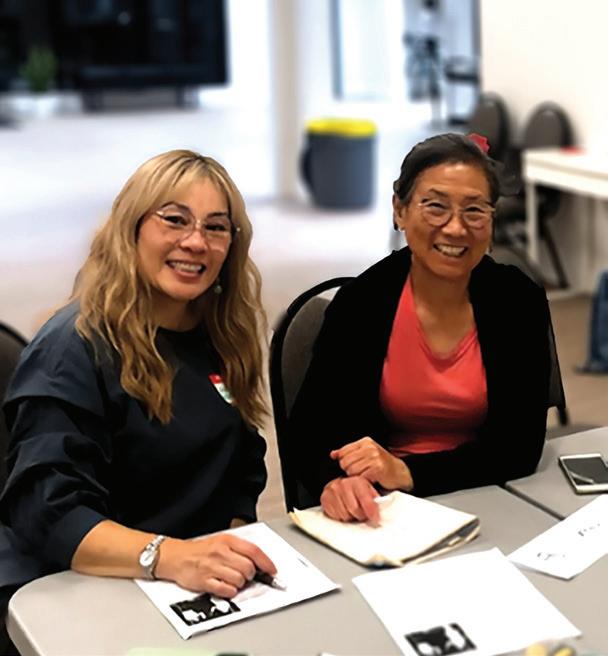
12 “Let’s Go”
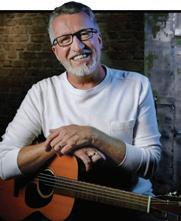
SOMEONE CARES
5 A Beautiful Diversity
Salvation Army congregation in Ottawa welcomes new Canadians into their neighbourhood.
CAMP TALES
8 Being Humble
One man’s lifelong journey with a Salvation Army camp.
COMMON GROUND
10 The Case of the Stolen Bicycle
Major Jason Sabourin had a decision to make. But could he go through with it?
16 Modern-Day Troubadour
Now in his fourth decade in the industry, singersongwriter Steve Bell shows no sign of stopping.
22 Putting the Pieces Together
A simple request led to a lifetime of service for Major Mary Millar.
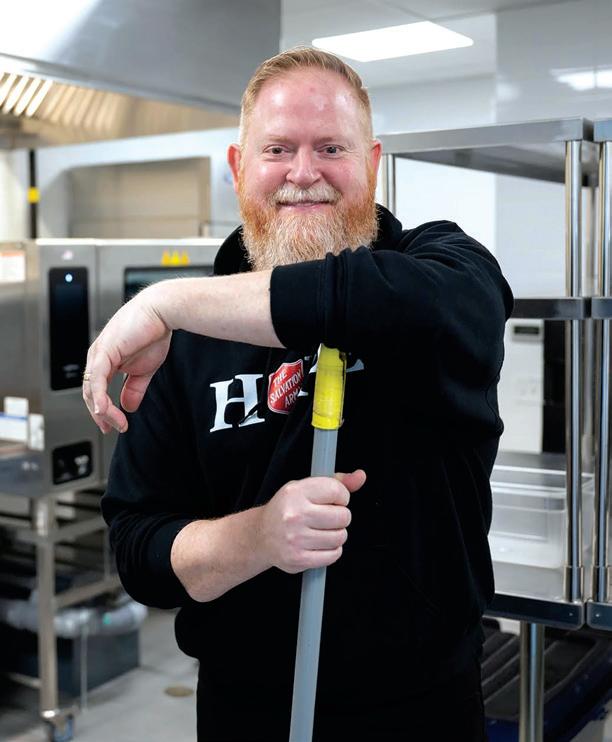
A young woman retrieves a family treasure at a Salvation Army thrift store in Saskatchewan. BE BLESSED
25 Eight Truths to a God-Blessed Life
A new series introduces Jesus’ teaching from the Sermon on the Mount. LITE STUFF
28 Eating Healthy With Erin Word Search, Sudoku, Quick Quiz. A GLOBAL LENS
31 Uniting Hearts
In El Salvador, The Salvation Army’s Brighter Futures Children’s Sponsorship Program provides a safe, nurturing environment.
Lost and Found
Reading “The Case of the Stolen Bicycle” on page 10, of the woman who found her lost family treasure at a Salvation Army thrift store, reminded me of my own lost-and-found story.
Shortly before Christmas, I had lent two of my favourite books to a friend, but when I asked her about them, she shamefully confessed that she, in her turn, had lent them out-and now she had no clue where they were. I was crestfallen.
That Christmas, besides my stint on the kettles, I volunteered to help some Army colleagues go carolling at a school for new immigrants and a special-needs facility. After a satisfying time, we dispersed to go shopping at our local Salvation Army thrift store. As I perused the book stacks, I jokingly told a friend, “Wouldn’t it be funny if I found my two lost books here?”
And then, there, on the shelf, were the same books! But not only were they the same editions, they were my own copies, bookplated and all!
With the quick turnover of items at the thrift store, I might not have found my books a day or even a week later. The volunteering of my time and effort had garnered an unlooked for and unexpected reward.
The redemptive quality of Salvation Army thrift stores cannot be denied. As with Christianity, they provide a second chance, in this case for a lost and wayward pair of books.
Besides the lost-and-found bicycle, this issue of Faith & Friends has an exclusive interview with Juno Award-winning singer-songwriter Steve Bell, and we debut a new limited series on Jesus’ Beatitudes, revolutionary teachings that resonate two millennia later.
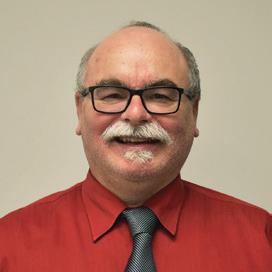
Ken Ramstead
Mission Statement
To show Christ at work in the lives of real people, and to provide spiritual resources for those who are new to the Christian faith.
Faith & Friends is published bimonthly by:
The Salvation Army 2 Overlea Blvd, Toronto Ontario, M4H 1P4
International Headquarters 101 Queen Victoria Street, London, EC4P 4EP, England
Lyndon Buckingham, GENERAL
Commissioner Lee Graves
TERRITORIAL COMMANDER
Lt-Colonel John P. Murray
SECRETARY FOR COMMUNICATIONS
Geoff Moulton, DIRECTOR OF INTERNAL COMMUNICATIONS, EDITOR-IN-CHIEF AND LITERARY SECRETARY
Pamela Richardson
ASSISTANT EDITOR-IN-CHIEF
Ken Ramstead, EDITOR
Kristin Ostensen
MANAGING EDITOR OF SALVATIONIST AND SALVATIONIST.CA
Lisa Suroso
GRAPHIC DESIGN SPECIALIST
Emily Pedlar
JUNIOR GRAPHIC DESIGNER
Rivonny Luchas
DIGITAL MEDIA SPECIALIST
Giselle Randall
SENIOR EDITOR OF SALVATIONIST
Abbigail Oliver
EDITOR OF JUST FOR KIDS AND STAFF WRITER
Logan Graves CIRCULATION CO-ORDINATOR
Scripture Unless otherwise indicated, all Scripture references are taken from New International Version
Contact Us P. (416) 467-3188, F. (416) 422-6217
Websites faithandfriends.ca, salvationist.ca, salvationarmy.ca
Email faithandfriends@salvationarmy.ca
Subscription for one year: Canada $17 (includes GST/HST); U.S. $22; foreign $24 P. (416) 422-6153
circulation@ salvationarmy.ca
All articles are copyright The Salvation Army Canada & Bermuda and cannot be reproduced without permission. Publications Mail Agreement No. 40064794 ISSN 1702-0131
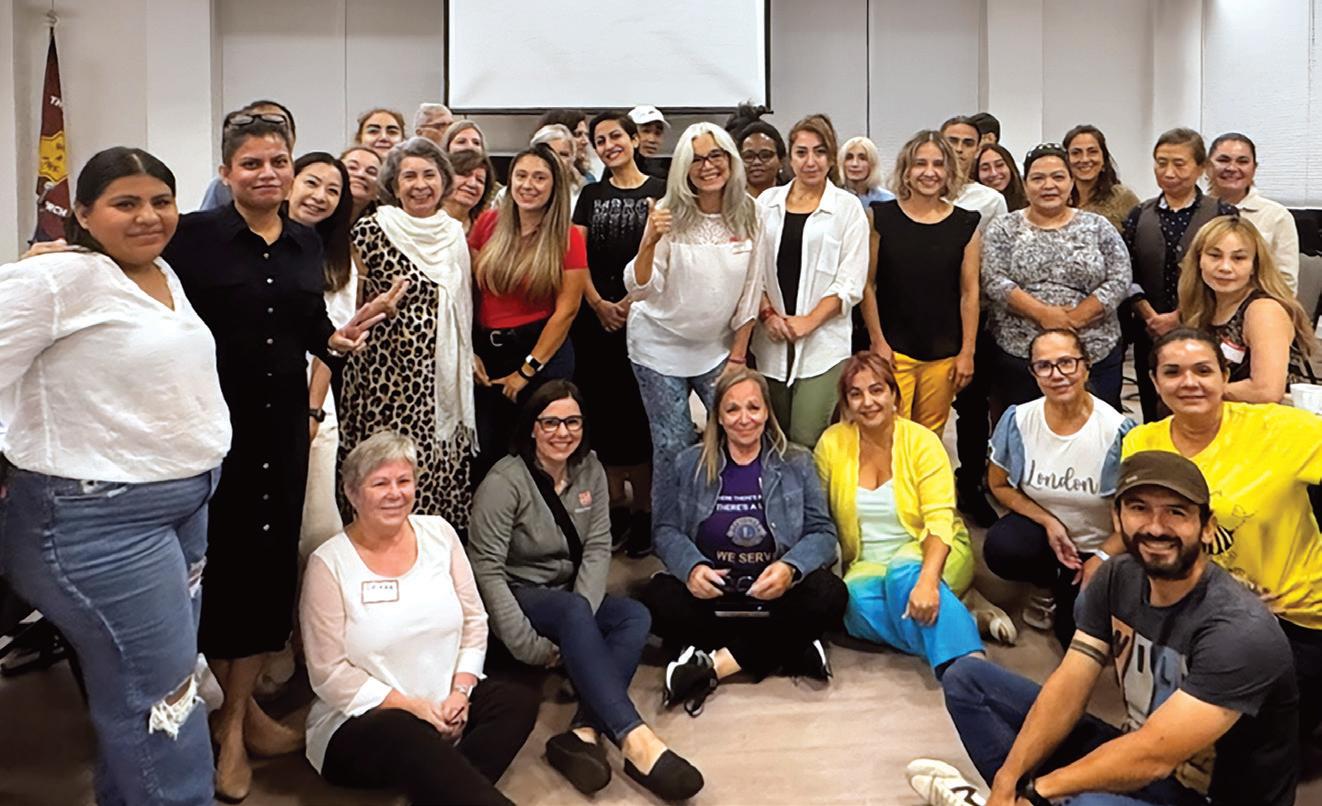
All Together
An English conversation class at Barrhaven Church aids new Canadians to feel at home in their community
Standing Tall
Many members of the Barrhaven congregation and community partners volunteer with the English conversation class
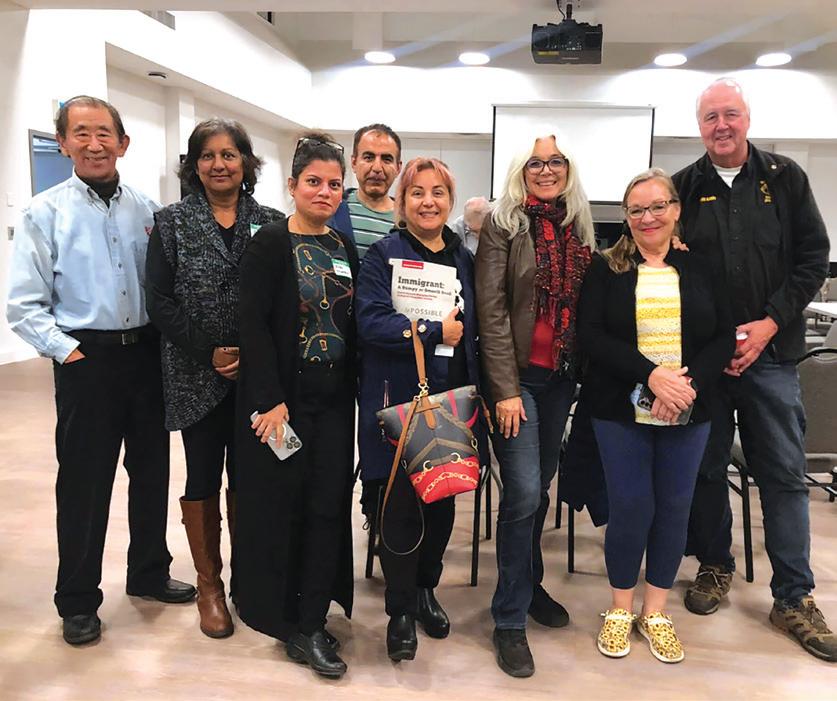
A Beautiful Diversity
Salvation Army congregation in Ottawa welcomes new Canadians into their neighbourhood.
by Jeanette Levellie
In the fall of 2023, two members of The Salvation Army Barrhaven Church in Ottawa approached Captain Laura Van Schaick with an idea. They wanted to start a multicultural ministry to reach out to newcomers in their neighbourhood.
“One of these individuals is an immigrant from Venezuela, the other from Korea,” says Captain Laura, who serves as a pastor at Barrhaven Church. “They understood what it is to be a newcomer to Canada and wanted to help support others in their transition to our country.”
Birth of a Multicultural Ministry
The result: a multicultural ministries program. One of the features of the ministry is an English conversation class, aiding new Canadians to feel at home in their community.
Love New Canadians (lovenewcanadians.ca), a Salvation Army mission partner that works with local churches, supported Barrhaven Church with English conversation class resources as they planned and carried out their ministry to immigrants, refugees and newcomers.
The people at Barrhaven Church thought English classes would be the best way to reach out to their neighbourhood. They knew how essential language is to help individuals feel they belong in a new country and culture. Communication is also vital for
education, employment and making friends. A quick search for similar opportunities in the area yielded few results, which proved to the team that this was a niche they could fill.
Although it took a year to launch the program, Captain Laura explains, it was worth all the effort.
“As a pastor,” she says, “part of my role involves supporting church members in using their God-given gifts to help make our community the best it can be.”
She loved helping these two individuals build a team, develop a program plan and network with community partners to launch the church’s multicultural ministries in the fall of 2024.
Flourishing Relationships
Captain Laura was encouraged by the enthusiastic response to the startup of the English conversation classes. Many members of the Barrhaven congregation and community partners stepped up to volunteer.
“On a regular basis, about 10 church members are involved in the classes,” Captain Laura shares.
But Captain Laura didn’t just encourage her congregation to get involved in the classes; she also played a part in their success. She personally facilitated some of the sessions and finds great joy in the ministry.
“I’ve learned a lot about the participants’ countries of origin—
Support System
“As a pastor,” Captain Laura Van Schaick says, “part of my role involves supporting church members in using their Godgiven gifts to help make our community the best it can be”
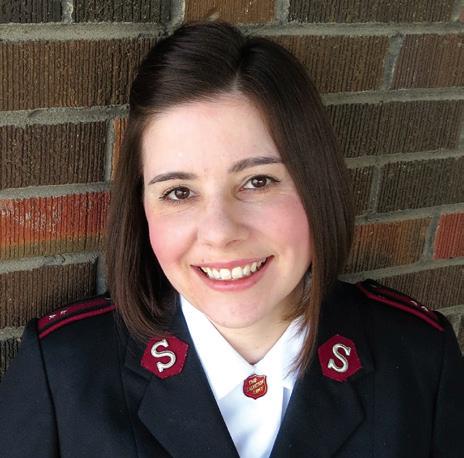
New ‘Do
An Iranian member of the English conversation class gives Captain Laura a haircut

they come from 19 different countries, including China, Costa Rica and Morocco—just as I have been able to share our distinctive Canadian culture,” she says. “A woman from Iran came early to one of the conversation classes and gave me a haircut. (She worked in this field before coming to Canada.) I’ve collaborated with an Afghani woman to write an article in Faith & Friends’ sister magazine, Salvationist, about the struggles of women in her country of origin. I’m thankful for the opportunity to amplify her voice.”
As well, the church has hosted international potluck meals, which provide opportunity for new Canadians to showcase their delicious ethnic cuisines.
Captain Laura believes this unique ministry has created wonderful opportunities for positive relationships to flourish, and she’s learned and benefited as much from
the participants as she hopes they have from the teachers of the classes.
Part of the Community
The Barrhaven congregation has a long history of welcoming new friends to Canada. They’ve sponsored refugee families in the past, most recently welcoming a family from South Sudan in 2018.
Last year a man from Ethiopia who the church supported was able to bring his wife and sons to Canada. The congregation provided support in many practical ways to prepare for their arrival and helped them feel welcomed.
“We have several congregation members who are newcomers to Canada themselves, and the broader church welcomes them fully,” says Captain Laura. “It’s beautiful seeing our congregation become more diverse as new friends to Canada become a part of our faith community.”

Social Climbers
Jacob Humble (centre), in his role as challenge course co-ordinator, supervises the rock-climbing course
Being Humble
One man’s lifelong journey with a Salvation Army camp.
by Juan Romero
Jacob Humble has been involved with The Salvation Army for most of his life. Currently the challenge course co-ordinator for Camp Sunrise in Gibsons, B.C., his connection to this camp goes back to when he was a toddler.
“My dad came to this camp when he was a kid,” Jacob shares. “He grew to love the place and worked here for a bit.”
Lifelong Commitment
His parents, who volunteered at camp, would often bring Jacob, and from a very young age. His constant presence led to one of his first childhood milestones at Camp Sunrise.
“I actually took my first steps here at camp,” Jacob says.
From the age of seven to when he was 16, Jacob was a camper.
He later participated in a leadership training program, which eventually led him to the position of challenge course co-ordinator. This is his fourth summer in this role, and he loves being a positive influence in children’s lives.
“The main objective is for them to have fun and do something that they wouldn’t normally get to do,” Jacob says. “It’s a chance for them to do new things that don’t involve a computer or the internet.”
Leading Campers
The challenge course includes physical activities, such as rock climbing, high ropes and ziplining. These help campers conquer their fears and promote teamwork skills. Jacob says that when he was a camper, they shaped his current interests.
“Some key takeaways for me were growing a sense of adventure and learning how to do things with my hands,” he says. “All that stuff was just so thrilling to me. I love that sense of adventure, which is something that I try to provide for these children.”
Additionally, Jacob also attended music camp, which sparked his passion for playing the guitar. Thanks to this skill, he leads worship at his local church and teaches other children how to play.
Preparing for the Future
Currently, Jacob is a student at the
University of Victoria. He hopes to become a high school teacher once he finishes his studies. He believes his experience as a co-ordinator at Camp Sunrise is helping him build valuable skills that he can put to work in the future.
“It helps with leadership skills; it helps me to learn how to manage a group of people and to guide them through an activity. I’ve learned different tricks to get a group’s attention, so it’s been a great opportunity.”
“I love that sense of adventure.”
JACOB HUMBLE
Jacob’s lifelong involvement with The Salvation Army has shaped him into the leader and example he is today for the children he helps. He credits his dad with instilling this passion in him.
“I think my dad is proud. I would say it was secretly his intention. He wanted me to get as obsessed with this place as he did. He definitely succeeded.”

I Heart the Army
“I am blown away by everyone’s kindness,” says Demi Peterson of the Salvation Army thrift store staff
The Salvation Army thrift store in Swift Current, Sask., recently reunited a local woman with a sentimental item that belonged to her late sister.
Unexpected Encounter
Demi Peterson was walking in downtown Swift Current with a friend when she happened by the thrift store’s display window. When she saw the blue-and-white cruiser bike, she stopped in her tracks. She knew immediately that it was the same one that had been stolen from her yard last year.
“I was out with a friend downtown, and we couldn’t find parking, so we ended up walking past The Salvation Army,” Demi explains. “I wasn’t even
The Case of the Stolen Bicycle
A young woman retrieves a family treasure at a Salvation Army thrift store in Saskatchewan.
by Kristin Marand
meant to be on the street that day, let alone downtown. I looked up, and right there is the bike sitting in the window.
“I couldn’t even speak a word to my friend. I just went right in.”
Emotional Transaction
Typically, items in the display window are reserved for silent auction, one way the thrift store raises money for local Salvation Army community programs in Swift Current, so Demi wasn’t sure if she’d be able to get the bike back.
Demi shared her story with the person working the till, who called the manager, Lori Reimer, to see what they could do. While waiting for Lori, a woman shopping in the store
overheard the situation and offered to help Demi get the bike back.
“I come upstairs, and there is a woman there, and she’s crying,” remembers Lori. “She starts to tell me the story about how the bike in the window was stolen last summer from her yard and how that bike belonged to her sister, who had recently died. She wanted to know how she could get the bike back.
“Demi showed me a picture of the bike from when she posted on Facebook that it was missing, but I could tell it was a true story. So we went into the window, and I pulled the bike out and gave it to her. She thanked me, and it was very emotional all the way around.”
“A
Soft Presence”
“And what was so lovely about it was we also had a customer in the store at the time who had offered to pay for the bike, and there was a gentleman who helped her when she left with the bike. It’s just so lovely to be part of such a good community where people are willing to help a stranger,” Lori says.

“So much kindness yesterday, and I am still in shock,” Demi wrote in a Facebook post in the Swift Current Compliments group. “I want to send out the absolute biggest thank you to the ladies at The Salvation Army yesterday. The lady working the till, the manager, the lady in line behind me who offered help and the man who held the door open for me afterward. Thank you to everyone involved. I was ready to pay any amount to get this bike back in my possession, and I am blown away by everyone’s kindness.”
Lori says that while this was a special circumstance, the thrift store is often a place of community connection.
“It’s a soft presence of the church,” she says. “We’re in a really good location, and lots of people walk by. At the till, Dawnell is very kind and very involved with the community. She’ll know if somebody has had a fire and knows the need. We also have people who come in every day. I think we’re just a place to go to see a friendly face. We are very missional in our intention.”
(left)
Kristin Marand is the manager of communications for The Salvation Army’s Prairies and Northern Territories Division. With a background in media and a passion for weaving language and sharing stories, Kristin is a proud Métis on her own journey of reclamation.
At the Ready
Major Jason Sabourin lends a hand during grand opening celebrations of the newly built Salvation Army Hope Church and Community Services facility in Ajax, Ont.
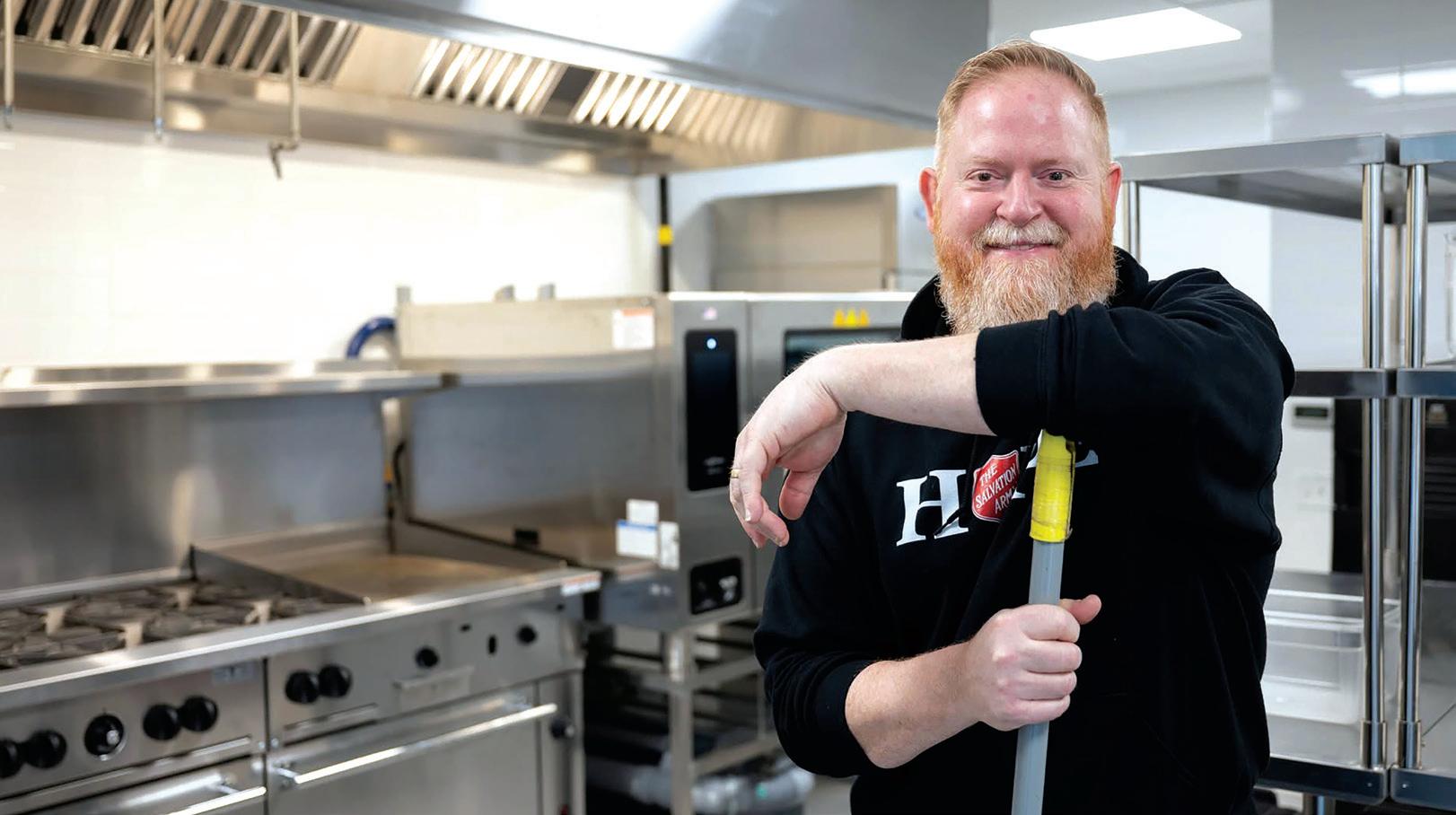
“Let’s
MAJOR
Go”
JASON SABOURIN HAD A DECISION TO MAKE THAT CHRISTMAS EVE. BUT COULD HE GO THROUGH WITH IT?
by Ken Ramstead
“
The first time I went to a Salvation Army church,” says Jason Sabourin, “there was a fellow there who looked to be in his 30s with a nice suit on— but he had a tattoo of a scorpion that stretched from the back of his ear all the way around to the front of his neck. I thought to myself, Hoo boy, you better get out of here. You’re not going to be welcome. My idea of church then was that
that was where all the good, clean people went. People are going to kick him out once they see that big tattoo.”
But what Jason saw was the pastor treating him the same as everybody else.
“It was like it didn’t matter,” he recalls. “The pastor saw him as an equal.
“That made a very big impression upon me.”
Thrift Store Church
Born in Toronto, Jason grew up in Ajax, Ont. His father was a police officer while his mother was a medical staff secretary and administrative assistant.
“I grew up pretty middle class,” he says. “Played hockey, that kind of thing, but church was not a part of our life.”
Because the family was halfCatholic, half-Protestant, they never discussed religion.
“We celebrated Christmas and Easter, but religion never entered our lives,” says Jason.
That is, until he met a girl and found out that Tammy was the daughter of Salvation Army pastors.
The Salvation Army? For Jason, that was a thrift store.
New Beginning
Jason and Tammy started to date.
“She was in her own wilderness time,” says Jason, “trying to find her faith and working through her journey.”
But he started to attend Army church services with her.
“Tammy’s father, Major Doug Butt, was a wonderful guy, very kind, very welcoming. We got along very well,” says Jason. “But I wanted to make a good impression on the parents, so I started to go to church on Sundays.”
That was when he witnessed Tammy’s father and how he interacted with the man with the tattoo.
Maybe there was something to this
Salvation Army, Jason thought. Intrigued, Jason started to read the Bible.
“I started to realize that this Jesus fellow was actually not who I thought He was. He was a lot more heroic in the way He pushed against the establishment, and I resonated with that.”
“I couldn’t deny the feeling that I was being called to something more. I was running out of excuses not to be a Christian.“
MAJOR JASON SABOURIN
No Excuses Left
God was working on both Jason and Tammy, who were now happily married. One day Tammy told Jason, “I feel like I want to get back to my roots, to my faith, like there’s something missing”
As it happened, The Salvation Army was opening a new church plant in Ajax, where they lived. The couple decided to attend the meet-and-greet.
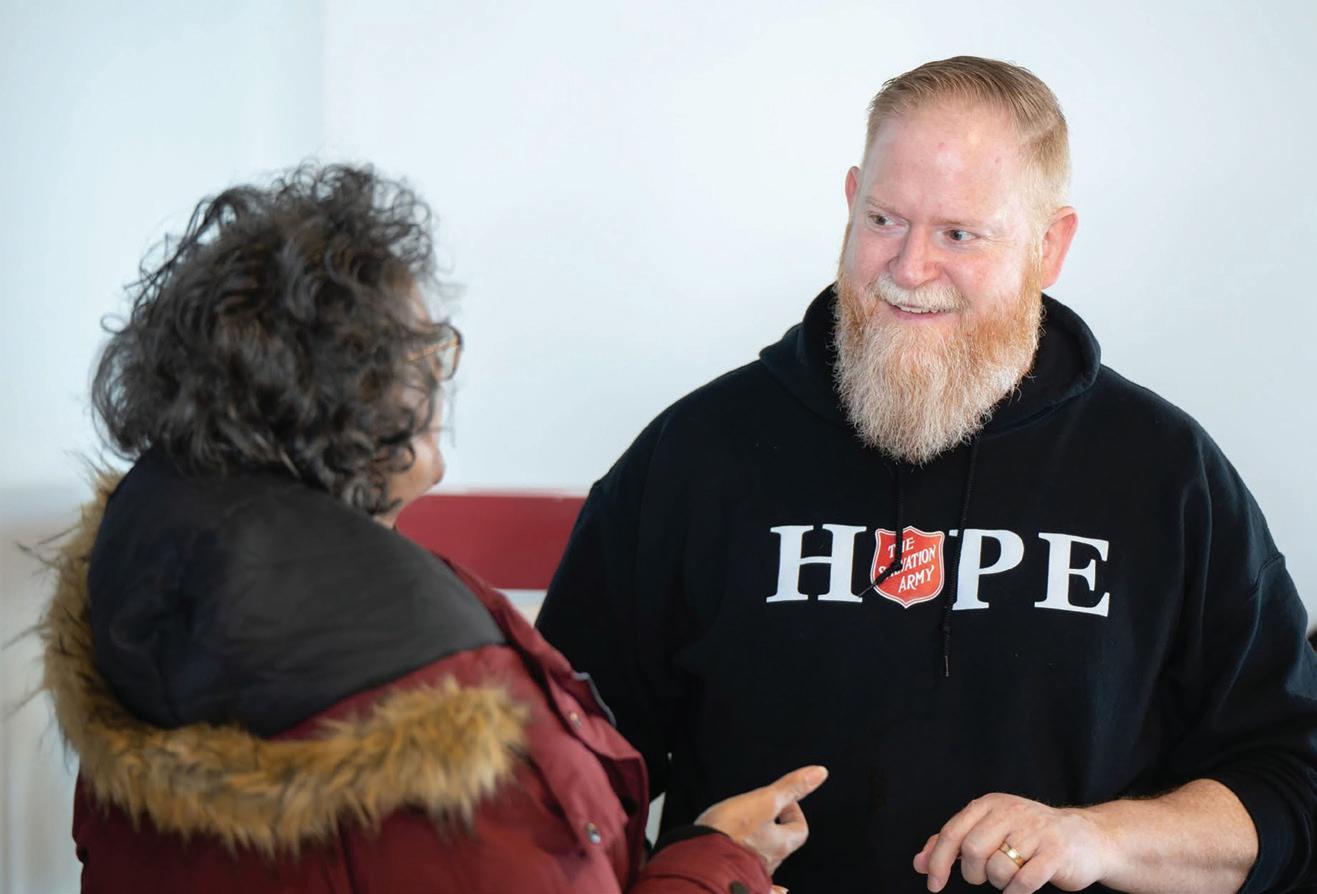
“The first thing I noticed was people my age, who had the same interests I had, such as hockey,” Jason recalls. “It wasn’t a stuffy church, either. The music was upbeat, and people seemed excited to be there.”
This could be OK, he thought.
The couple started attending church on a regular basis, and Jason’s life started to change.
“I had stopped drinking altogether,” he says. “I was reading my Bible and I even devoured volumes of Salvation Army history. My spirit was already committed, and I couldn’t deny the feeling that I was being called to something more.
“I was running out of excuses not to be a Christian.”
“All In”
As Christmas Eve 2000 approached, Jason realized that the evening service was going to be where he had to take the next step.
He knew that, for Tammy’s parents, the altar call, where you declare your faith in front of the entire congregation, was important.
“I felt that, too.
“In my spirit, I had already committed to God, but I needed that outward peace. You have this connectivity to God but by going forward at this time, you completed the transaction—like closing the loop in electricity.
“Was it a necessity? No. Was it a necessity for me? Yes. This is something I needed to do. This was the last step.”
However, it was one thing for Jason to know what had to be done, and quite another to do it. And as he held his wife’s hand in the pew that night, he knew what he had to do.
Tammy had been going through her own journey and was ready to recommit her life as a Christian, but she wasn’t going to do that without her husband.
“At that point, I just grabbed her hand and said, ‘Come on, let’s go,’ ” Jason says. “And so we went.
“Internally, spiritually, it was quite a moment because I realized I held nothing back anymore. There was nothing left. I was all in.”
Full Circle
The Sabourins attended the College for Officer Training in Winnipeg and became Salvation Army pastors. Eleven years ago, they were appointed to lead The Salvation Army’s Hope Church in Ajax, the very place where they had started their faith journey so long ago.
“Hope is the place that I came to faith and then went out to pastorship from there,” says Major Jason.
“To come back almost 10 years later to give leadership, to walk with people in town who have watched you grow up and helped you on your journey, is quite an amazing thing.”
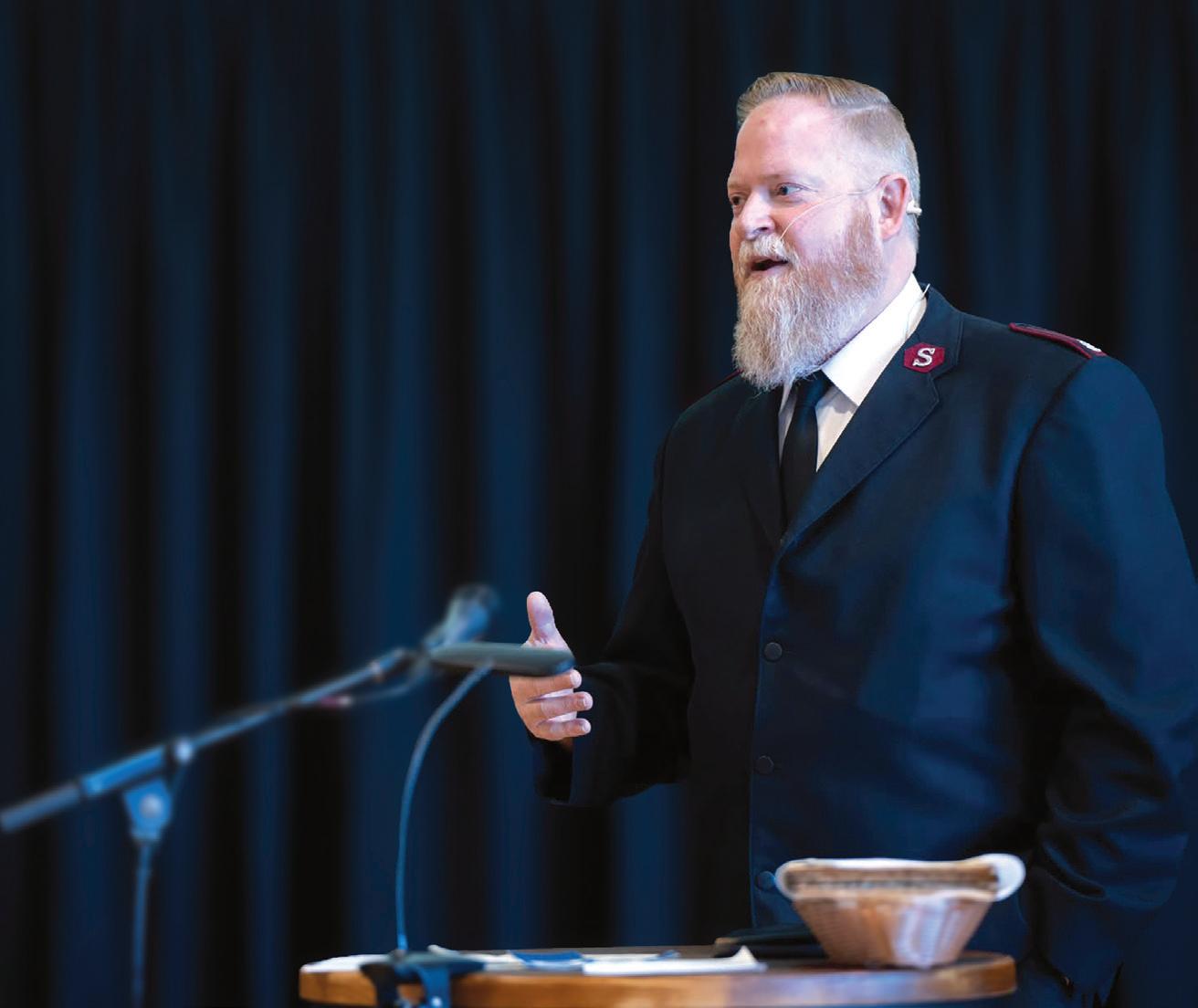
Guitar Man
Since 1989, Steve Bell has performed more than 2,000 concerts to half a million people around the world, including Canada, the United States and the Caribbean


NOW IN HIS FOURTH DECADE IN THE INDUSTRY, SINGERSONGWRITER STEVE BELL SHOWS NO SIGN OF STOPPING.
He’s been called “a resolute Christian pilgrim; a spiritual sommelier; a ‘deeper-life’ troubadour” by award-winning film producer Jim Van Eerden, and the description is apt. Singer-songwriter and guitarist Steve Bell is one of the best-known Christian musicians in Canada. Among his many awards in his 35-year career are two Junos and the Queen Elizabeth II Diamond Jubilee Medal.
“I’ve just let the songs come,” Steve says. “I recorded them, and I go sing them wherever people want to hear them, and that has seemed to be enough.”
Transcending and supplementing his music—23 albums and counting—is Steve’s commitment to advocacy, which has raised significant support for organizations such as World Vision, Canadian Foodgrains Bank and Compassion Canada.
Faith & Friends interviewed Steve in Winnipeg.
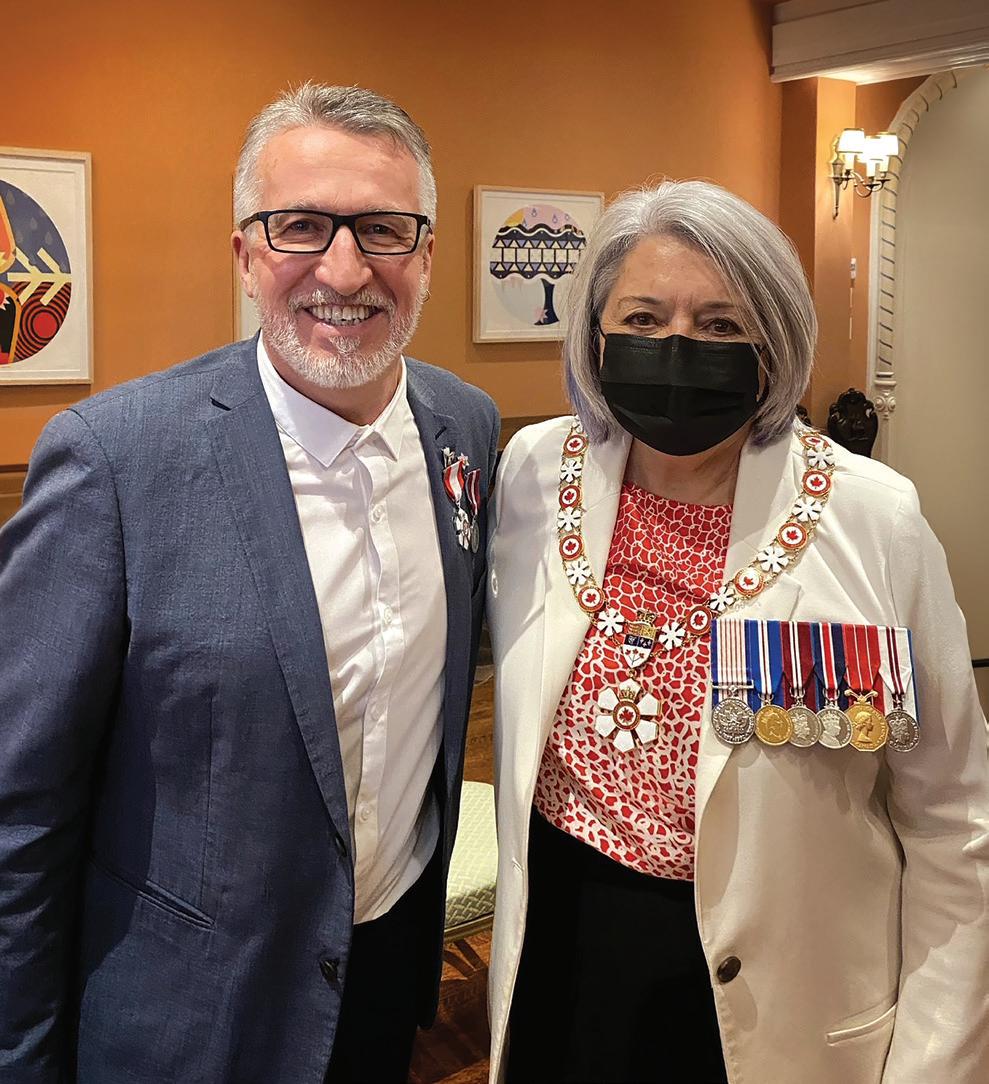
You are a member of the Order of Canada. Can you tell us about that? Yes, my name was announced in December 2022, along with the names of other appointees. The investiture took place at Rideau Hall last December, and I had lunch with the Governor General, the Honourable Mary Simon. That was wonderful because she’s Canada’s first Indigenous Governor General. That’s meaningful for me having been a small part of some Indigenous justice efforts. I see the award not so much as a recognition of the work I’ve done, but more for what they hope I will continue to do in the future, to contribute with my art and my efforts to the betterment of Canada. And that’s just fine with me!
Medal Holder
Steve with Governor General Mary Simon on the day of his official investiture of the Order of Canada
What is the song that you’re the proudest of?
I wrote a song in 1994 called Burning Ember in response to the writings of a Russian Orthodox priest in the late 19th century, Father John of Kronstadt. He wrote about the fundamental dignity of the human being, who he said is like a piece of iron that, if you put it in a fire, has the capacity to take on the qualities of fire, heat, light. And if you leave it there long enough, it’ll turn white hot. The iron, even though the energy of fire is foreign to it, will take it and hold it. You can burn with it, you can probably start another fire with it, but if you put it out, it turns back to cold metal.
His message was to lay our life in the fire of God’s divine love in order to become by grace what God is by nature. Anything less is beneath our dignity.
When I sat back and looked objectively at Burning Ember, I realized that the song was wiser than I was. The song knew more than I did. I’m constantly going back and seeing something new in it that I didn’t know was there before. I’m really not writing songs anymore to try to tell you what I think or what I know. Songwriting for me now is a process of discovery, and how I wring a bit of truth or goodness or beauty out of it.
That song fundamentally changed how I think about songwriting.
How has songwriting deepened your faith?
Ronald Rolheiser is a Catholic priest and theologian who wrote a book called Holy Longing. I was at a Henri Nouwen Society conference years ago in Toronto, and he was a keynote speaker; I was just sort of “the singer guy.”
He said the difference between Nouwen’s writing on spirituality compared to everyone else’s is that most people are writing about spirituality while Nouwen’s writing is spirituality. He said it’s not pointed to anything. It is the thing.
I realized that songwriting was like that for me. It is how I pray. It’s how I think and how I learn. When I sing my songs, I’m actually letting you in on my personal prayer diary.
Have you had any interactions with The Salvation Army?
My wife graduated from Booth University College in Winnipeg with a degree in social work.
Over the years, I have performed at their chapel. My wife wanted to retire from teaching, but she wanted to get into social work. One morning, I was performing at Booth and my wife was with me. We didn’t even know there was a socialwork program at Booth. As I was setting up, a faculty member asked


“When I sing my songs, I’m actually letting you in on my personal prayer diary.”
STEVE BELL
Photo: Jason Johnson
if my wife wanted a tour. When the woman realized Nanci was interested in social work, she told her all about it. Within a few months, Nanci had enrolled.
What do you think of The Salvation Army?
Growing up, my dad was a prison chaplain at Manitoba’s Stony Mountain Institution and Salvation Army folk would come in for services or to help out, so I was constantly exposed to their work.
But my earliest recollection was as a little boy. My father was the pastor of a Baptist church in Drumheller, Alta. My parents were best friends with some Salvation Army pastors. I was intrigued by the uniforms and how different their church was to ours. I’m not putting down my church, but there really was no effort to address ongoing community needs. For the Army, though, that seemed to be the core of who they were. I was impressed by that.
Who are your musical influences?
If I had to choose one name, it’d be Bruce Cockburn. He’s the guy. I saw him in 1978 when I was 18. I grew up in a Baptist fundamentalist-lite culture from the Prairies where musicians had to give an altar call, had to mention very specific sins they warned against, had to quote
Scripture, things like that.
And here comes this guy who did none of that. He talked about social justice issues, which I didn’t know were the concern of a Christian. His scope of Christian concern just rocked my world.
Then there was his attention to detail and the beauty of his guitar playing. For most of us who grew up in youth groups, we played a couple of chords and sang. When I saw him, I thought, There’s a ministry in that. Excellence and artistry communicate something that words never will.
Where do you see yourself in a year?
In five years? In 10 years?
Well, that’s a really pertinent question for me now. This year, I’ll be an official senior, and so I’m starting to ask questions.
How do I take the work I’ve done, the songs God has given me, the ministry I’ve built, the social capital I have, and how do I walk that into this next stage of life? How do I be a prayerful, nonanxious presence, but also at the same time speak the truth and use the gifts God has given me to woo people to a more Christian way of living?
These are the questions I need to be thinking about in the next four or five years if I’m going to continue into my 70s, which I think I can do. There’s nothing in me that wants to retire!
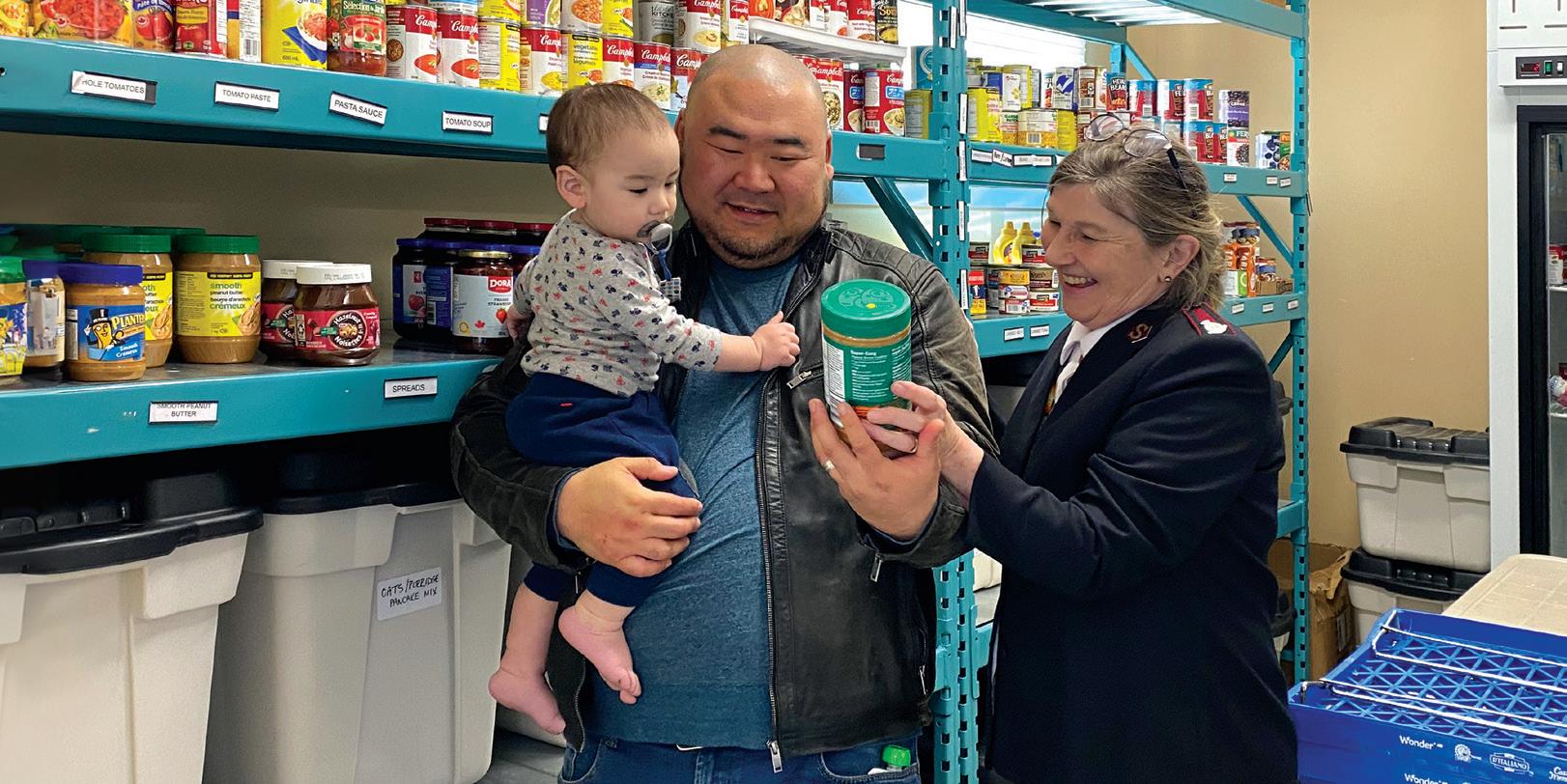
Putting the Pieces Together
A SIMPLE REQUEST LED TO A LIFETIME OF SERVICE FOR MAJOR MARY MILLAR.
by Melissa Yue Wallace
“Idecided to become a Salvation Army pastor because I felt called to actively live out my faith by directly serving those in need, making a tangible difference in people’s lives,” declares Major Mary Millar of the Wiarton Community Church in Ontario.
“I knew the Army was where I was meant to be. It made sense of my life, and I’ve never lost that vision in 30 years.”
“Just Do Christmas”
In 1994, Major Mary was working as an image consultant, helping clients with makeup, wardrobe planning and photography in Kincardine, Ont. Her husband, Dwight, worked at Hydro One Ontario and the couple had three children: Kris, 14, Greg, 10, and Amanda, six.
That year, the Millars moved to Owen Sound, Ont., to be closer to Dwight’s work, and it wasn’t long
before the family began looking for a church home. Dwight suggested The Salvation Army Owen Sound Community Church, as he remembered having a positive experience at an Army ministry in Kirkland Lake, Ont., in his youth.
As they began forming connections and getting involved in various activities, they felt comfort and warmth with their new church family, so much so that Major Mary became a soldier, an official member of The Salvation Army, in May 1995, and her children followed in her footsteps.
Meanwhile, just north of Owen Sound, The Salvation Army in Wiarton needed people to serve.
“The Army had a 600-square-foot building on Main Street and limited funds,” Major Mary recalls. “As they neared Christmas, there wasn’t anyone willing to step in to help the community.”
In November 1994, a Salvation Army pastor asked her a question that would change everything:
“Mary, will you do Christmas?”
“At that point, I couldn’t have answered three A-B-C questions about The Salvation Army ... I knew nothing,” she says. “They had a $23,000 budget and a part-time position available.
“I agreed to ‘just do Christmas.’ ”
All these years later, Major Mary is still answering the call.
Picture Perfect
In her first testimony at The Salvation Army in Owen Sound, Major Mary shared that she felt God called her there because it was the kind of place that would have helped her brother, Charles Edward Maddock.
Charles had been working in Orillia, Ont., at an institution for people with developmental disabilities when he experienced a terrifying incident where a client attacked him, choking him until he passed out. Treatments, therapy and prescription drugs seemed to cause deeper darkness until, finally, Charles ended his own life.
“My family was in such trauma at the time, and I thought, If only The Salvation Army had been there for my brother in his time of need,” she says.
Welcome Friend
“It
is an incredible privilege to bring the light of the gospel of Jesus to those who are struggling with the darkness,” says Major Mary
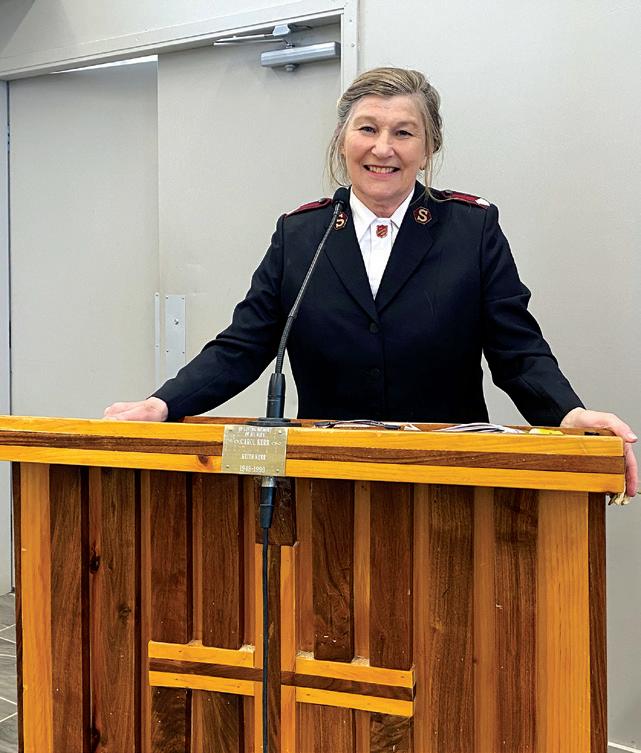
“But on New Year’s Day 1995, I felt like I was in front of a table with all kinds of puzzle pieces that made a picture, and they all fit together.”
Unexpected Blessings
In October 1997, Wiarton Community Church moved to a new location. The building sits between Charles and Edward streets— unexpectedly sharing her brother’s first and middle names.
“The other piece of the puzzle slipped into place in 2003, just before Dwight and I became lieutenants,” continues Major Mary. “We were sorting items in this big, 8,000-square-foot facility—and there was my brother’s Bible that he had been given when he was 19 years old in 1971.
“The bottom line is that the journey has not been easy, but God has bestowed so many blessings, above and beyond.”
A Matter of Trust
The surrounding community in the Bruce Peninsula is a thriving tourist destination in the summer, but in the winter, many individuals are unable to find work or support themselves due to rising costs.
Many find hope in services at The Salvation Army in Wiarton, which includes the Bruce Peninsula Community Food Bank, the Nawash Food Bank, community meals (called Table Manna) or other offerings, such as the community
garden, mentorship program, family services, free tax clinics, social activities, services for seniors, a children’s literacy program, Pathway of Hope case management, and Trades Start, a work experience program for youth to help them kickstart their careers in skilled trades.
“Our connection with the First Nations community began in 1995 and, initially, there was a lot of distrust of the Christian faith due to history,” says Major Mary.
Some of the first programs The Salvation Army launched in 1995 were the food bank and school lunches, as many in the community were showing signs of depression and didn’t have food to send with their children for lunch. “It is so inspiring to see some of the children who came into the food bank with their parents now with their own kids,” says Major Mary. “Many have a steady job, car and own their own home. They trust us and bring their kids to our programs.
“It is an incredible privilege to bring the light of the gospel of Jesus to those who are struggling with the darkness,” says Major Mary. “Whether that be from financial challenges, health concerns or relational struggles—to witness first-hand the transformative impact of compassion and support on individuals and families facing challenges—and to see them regain hope and stability through the services we provide.”
Eight Truths to a God-Blessed Life
A new series introduces Jesus’ teaching from the Sermon on the Mount.
by Jeanette Levellie
Jesus preached. A lot. According to Matthew 9:35, “Jesus went through all the towns and villages, teaching in the synagogues, proclaiming the good news of the kingdom.”
But in Jesus’ very first sermon, given on a hillside in Galilee and known as the Sermon on the Mount, He laid the foundation for His entire ministry by unpacking eight “Beatitudes,” a term that comes from a Latin word meaning “blessings.” Jesus declared God’s favour and kindness toward His faithful followers.
Character Study
The Son of God came to earth, along with His gift of salvation, to produce character in His followers, the type of character that will help us know God in a deeper way and reflect Him to others. Jesus also longs for us to know a personal God who gives good

gifts to His children (see James 1:17).
Even 2,000 years ago in the ancient Hebrew culture, Jesus’ teachings went against mainstream thinking. Yet every word He spoke is still relevant because the truths He gives are eternal. Jesus used mysterious phrases in that first sermon, such as “poor in spirit,” “hunger and thirst for righteousness” and “pure in heart.”
What do these unusual sayings mean? And why should we make them part of our lives?
This new series will explore the eight truths Jesus taught His followers to develop a God-blessed life, uncovering these jewels of wisdom and the life-changing journey Jesus offers us.
For a sneak peek into the teachings of Jesus on the Beatitudes-the blessings of God-see Matthew 5:1-12. And turn the page to read the first article.
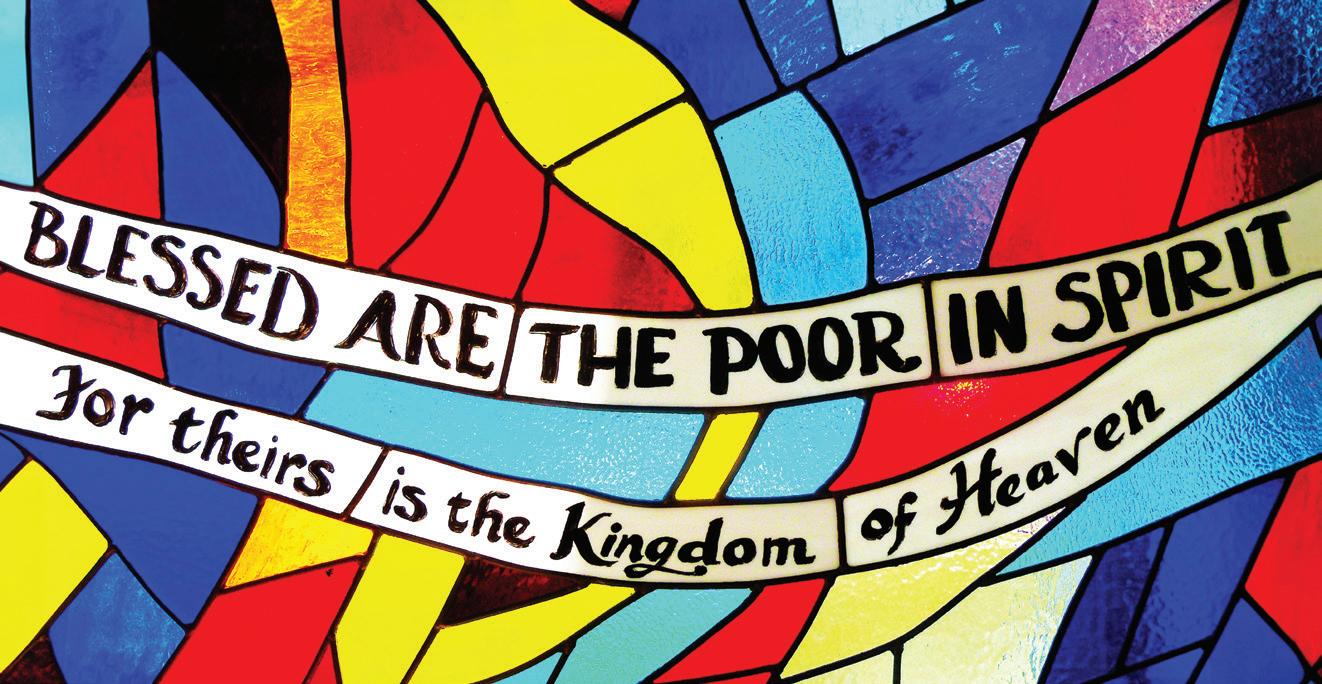
Blessed Are the Poor in Spirit
In
the Sermon on the Mount, Jesus opens with a surprising way to gain
a huge reward.
by Jeanette Levellie
The Jews who sat on the hillside listening to Jesus teach were probably shocked. In what has come to be known as the Sermon on the Mount, this new rabbi showed His listeners the way to God’s heart, instead of laying down a list of rules. In the first sentence, Jesus promised that for those who are “poor in spirit,” God will bestow the entire kingdom of heaven (see Matthew 5:3). Wow. An entire kingdom—a heavenly one—will be ours if we’re
poor in spirit. But what did Jesus mean? And how can we develop this attitude?
“You’re God. I’m Not”
We generally associate the word “poor” to mean a lack of money. We fight against poverty, as we should. Any kind of physical or emotional lack puts us at a disadvantage. But that’s not the kind of poor Jesus meant.
The term “poor in spirit” means
God gives favour to those who have a humble heart, because they’re the ones who admit they need help. JEANETTE LEVELLIE
“humble.” Simply put, to have a humble heart means we realize how dependent we are on God. We acknowledge that God is the source of everything good in our lives. The moment we reach that place of total dependence on God, our hearts open for Him to give us “every good and perfect gift” (James 1:17).
When I was little, my father said that his favourite Bible verse was, “God helps those who help themselves.” I later learned that “verse” isn’t even in the Bible. So, I’d like to change my father’s saying to, “God helps those who can’t help themselves—and will admit it.”
God gives favour to those who have a humble heart, because they’re the ones who admit they need help. They sincerely say, “You’re God. I’m not.”
Of course, we can’t humble ourselves without Jesus’ help. When we recognize this truth, it takes the pressure off us to earn our way into God’s good graces. We ask Jesus to show us how to surrender our hearts to Him. It’s the same kind of childlike faith we originally used when we first heard the good news about Jesus’ love and forgiveness— and admitted we couldn’t save ourselves.
The King and Us
But what’s in this “humble attitude” thing for me? How do I benefit? you might think.
I’m so glad you asked!
When Jesus says that God will give us His kingdom if we rely on Him, He’s speaking in spiritual terms. Although heaven is a real, tangible place where Christians will live forever with God, the kingdom of heaven is not a place. It’s our position of peace with God through Jesus. It’s the privilege of knowing God as our Father, friend and provider, not merely our king.
Because we are God’s children, we allow Him to be in charge of our lives. This is how we live in God’s kingdom and gain everything we need: peace of mind, provision, victory over sins and habits, healthy relationships and emotional well-being.
God’s very nature is to give. He loves to give. In a later teaching, Jesus told His followers, “Do not be afraid, little flock, for your Father has been pleased to give you the kingdom” (Luke 12:32).
As we give our hearts to God in humility, He gives us His kingdom in return.
Not a bad trade.
Eating Healthy With Erin

WHIPPED FETA AND BEET APPETIZER
TIME 10 min MAKES 2 servings SERVE WITH grilled chicken or salmon

180 ml (¾ cup) feta cheese
120 ml (½ cup) 2% plain yogurt
1 garlic clove
15 ml (1 tbsp) fresh lemon juice
15 ml (1 tbsp) fresh dill
375 ml (1½ cups) pickled beets, sliced
30 ml (2 tbsp) pistachios (optional)
cracked black pepper drizzle of honey
1 French bread baguette
TROPICAL SMOOTHIE BOWL
TIME 5 min MAKES 2 servings SERVE WITH granola

250 ml (1 cup) frozen mango
250 ml (1 cup) frozen pineapple
180 ml (¾ cup) coconut milk
60 ml (¼ cup) water
3 ice cubes
60 ml (¼ cup) strawberries, sliced
30 ml (2 tbsp) shredded coconut
sliced mango for garnish
1. Whip feta, yogurt, garlic and lemon juice together until smooth.
2. Using the back of a spoon, spread the whipped feta on a serving plate and sprinkle with fresh dill.
3. Top with beets and roasted pistachios. Add black pepper and honey.
4. Slice baguette and arrange on a plate.
1. Blend together frozen mango, frozen pineapple, coconut milk, water and ice cubes.
2. Sprinkle sliced strawberries and shredded coconut on top of blended mixture and add sliced mango for garnish.
QUICK QUIZ
1. In music, what are three or more notes played together called?
2. What is South America’s largest country?
3. What is the branch of medicine dealing with the heart called?
Visit faithandfriends.ca/subscribe or call (416) 422-6153 today! Fill in the grid so that every row, every column and every 3 × 3 box contains the digits 1 through 9.
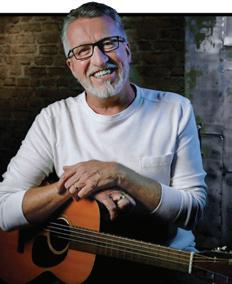
by Kevin Frank

Word Search A Jaws-Dropping 50 Years

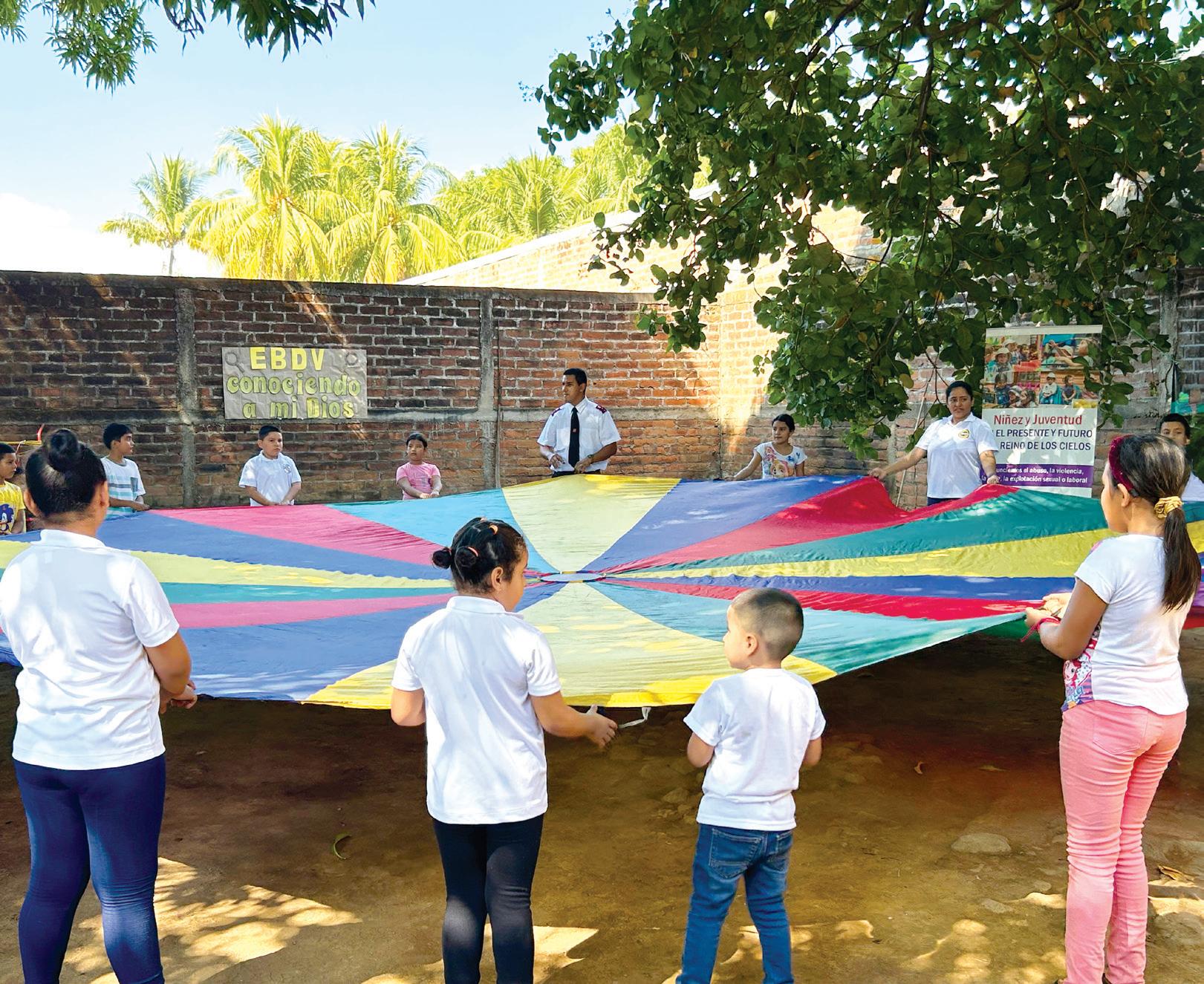
Uniting Hearts
Children in Usulután, El Salvador, come together for a vibrant outdoor activity, supported by The Salvation Army’s Brighter Futures Children’s Sponsorship Program. The Usulután church provides programming for children ages five to 14, including educational support, arts and crafts, physical education, dance and drama. By offering nutritious meals—often the only meal of the day for many—the program helps combat food insecurity while also reducing school dropout rates and the risk of gang recruitment by providing a safe, nurturing environment.

